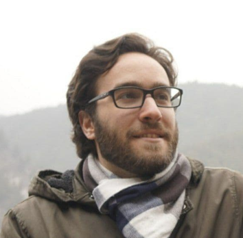Poems translated from the Chinese to Italian by Federico Picerni, Italian to English translation by Pina Piccolo
I am just going to take a few seconds to provide the readers with a brief introduction that should be read before getting into these poems. Both poets are migrant workers. As such, they come from the vast rural areas of China but spend a great part of the year working in the cities as manual laborers. The Lunar New Year (which is incorrectly referred to in the West as the Chinese New Year), this year fell on 25 January and is one of the very rare occasions in which migrant workers can go back to their place of origin to reunite with their families. This year the traditional celebration coincided with the outbreak of the epidemic. Traditionally people spend one week at home for this festivity, “the Golden Week”. After the announcement of the national emergency on 20 January and the lockdown of the Hubei province, where the city of Wuhan is located, on the 23rd, the vacation time was extended first by one week, and then until further notice. Many workers made it back to the cities no earlier than mid-March. It is important to keep these facts in mind as it will be shown clearly in the poems, that there was an intersection between two elements: i.e., the return of the migrant workers to countryside (the birthplace of many of them), with all its charge of nostalgia and contemplation, and the raging of the virus. Both elements combined and blended with creative process of the authors, producing an original and fascinating encounter in their poetry.
Rao Jinhui 饶金辉
Temp Worker
on the steps of the twelfth month
I wrap and press
the bitterness of a whole year
noiselessly I store it in my heart
hidden in a corner
with fashionable clothes
I replace the same old uniform
the suitcase I drag along
is chock full of city fragments
scattered around
the happiness
I take back home
waits apprehensively
the next departure.
6 January, 2020
- The last month of the lunar year.
—
In the Countryside Escaping the Epidemic
on a country lane
an old ox is lingering on his way back
without a mask getting in the way
he casually chews
the languor of time
the smoke of fireplaces at sunset
like warning fires
propagates
an ancient signal
the sun rises as it always does
flowers bloom like they did before
and mountains and rivers
and wine and poetry
The landscape here is beyond compare (*)
aside from the lengthening of the journey
I don’t notice
many anomalies
Only the racket made by a mother and her son,
our neighbors, fighting over
throwing the firecrackers
Inadvertently
rips up the silence of the countryside
19 February 2020
(*) Lines quoted from a 1934 ‘landscape’ poem by Mao Zedong titled “Huichang”.
—
An Old Slogan on a Village Wall
“Ten Thousand Years!”
at the end it turned out to be only a sublime
wish of humanity
but those who succeeded in living
and managed to escape
old age
infirmity
Illness
death
those who once
would yell “Ten thousand Years!”
as they marched squared off in columns
with devotion
are now gone having followed the “Ten Thousand Years”
only a stained wall
still keeps
yesterday’s traces
scarlet red in their time, and now swine blood red
the slogan “Ten thousand Years”
clear as it was then.
24 February 2020
The locution wansui 万岁 can be translated with “Long Live”, but literally means “Ten Thousand Years”. Historically it was the greeting devotedly addressed to the Emperor, but starting from the early twentieth century it took on a more ‘popular’ meaning and was chanted in the great mass movements not as a wish for the sovereign, but rather as a slogan. During the Cultural Revolution (1966-1976) these words were commonly painted on outside and indoor walls, in large, rigorously red characters and were meant to be addressed to Chairman Mao Zedong and the Chinese Communist Party. Even today it is not rare to see this slogan painted in country villages and some urban areas, though the writing is faded by time.

Ni Zhou 逆舟
Distance from the Coronavirus
a random cough
leads you to suspicion
even a sneeze
leads you to suspicion
yesterday the neighbor had a sore throat
he was overtaken by deadly anxiety
even the tiniest problem
can lead you to suspect
it is that damned virus
we have been suspecting for a month
that the virus is hiding in a dark corner
and could catch us
unaware and
defenseless
—
Disinfestation
because of the new coronavirus
the village has arranged a disinfestation
trees are being disinfected
plants are being disinfected
houses are being disinfected
the air is being disinfected
truth be told, no one has been infected
in our village
but because on cell phones and TV
All the talk is only about coronavirus
it seems like the virus were already here
in the village
—
Changsha, Today
today I came to Changsha
and realized that the streets
are not those streets
the houses are not those houses
not even the sky is that sky
and the people are not those people
I find myself cautious towards all these things and people
I took no notice of before
today I am leery
and they too are leery towards me
we keep an eye on one another
we hold our breath
as though something had happened to us
the world has grown weaker

All poems were published in the Gongren shige (Worker’s Poetry) blog. This article is republished from www.thedreamingmachine.com



























0 Comments